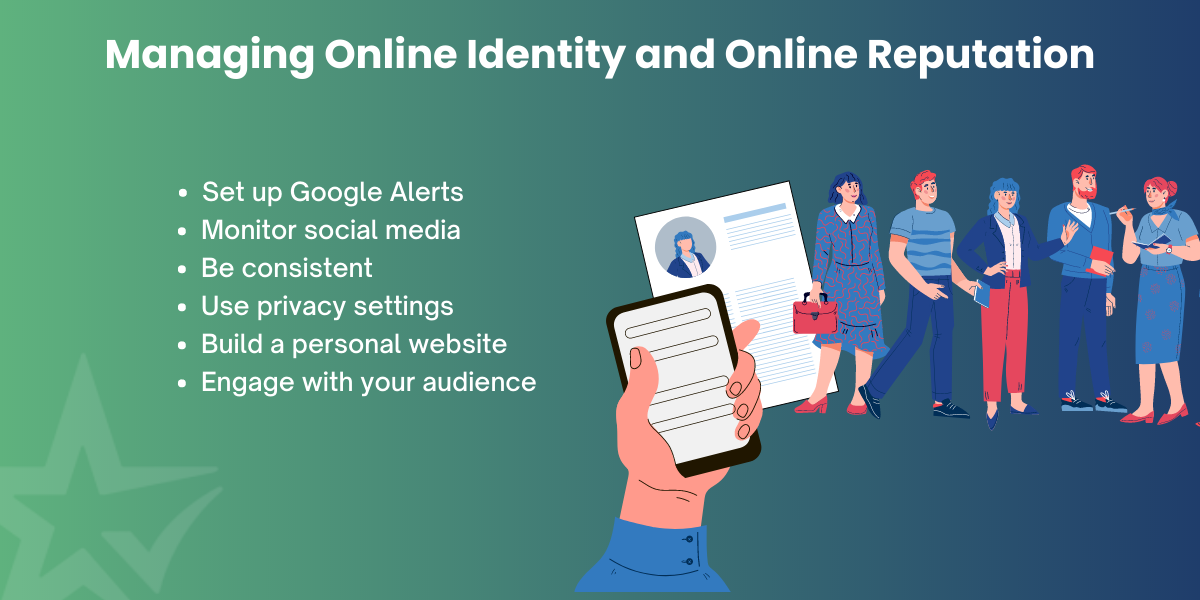SaveRepute is a done-for-you Online Reputation Management services
“How does an online identity differ from an online reputation?” We often hear this question. And rightly so, since many people confuse these terms and use them interchangeably. However, they are not the same thing. Although they both refer to a person’s clear online presence, these concepts are different and have different meanings. We will examine the distinctions between online reputation and online identity in this article from SaveRepute Online Reutation Management Company.
Table of Contents
Defining Online Identity
The total of a person’s online information constitutes their online identity. Any publicly accessible information, including data from blogs, social media profiles, comments, and online activity, is included. Online persona refers to the representation of oneself online.
Online identity can be divided into two groups: intentional identity and unintentional identity. A person’s intentional online identity is the data they voluntarily disclose online, like in blog posts or social media updates. Unintentional online identity refers to data that is gathered about a person without that person’s knowledge or consent, like information gathered by cookies or search engines.
Defining Online Reputation
The impression that other people have of a person based on their online identity is known as their online reputation management. It is the general perception of others regarding a person’s moral character, plausibility, and reliability, as shown by their online persona. A person’s actions, comments, and online interactions can have an impact on their online reputation.
Additionally, online reputation can be divided into two groups: personal and professional. An individual’s social media profiles, online behavior, and personal website all contribute to their online reputation. A person’s professional online presence, such as their LinkedIn profile, company website, or industry publications, is the foundation of their online reputation.
Also Read: What is Reputation Defender
Exploring the Differences between Online Identity Differ From an Online Reputation
Here are some of the common ways to differentiate Online Identity Differ From an Online Reputation:
- Online reputation is the opinion that others have of a person based on their online presence, whereas Online Identity Differ From an Online Reputation is the information that a person presents online.
- Online reputation is always the outcome of how other people view a person’s online activity, whereas online identity can be either intentional or unintentional.
- Online identity can be more easily managed, whereas online reputation, which depends on the opinions of others, can be trickier.
- Online reputation requires input from others, whereas online identity can be managed by one person.
- Online identity is more concerned with the person, whereas online reputation is more concerned with how the community sees that person.
Managing Online Identity and Online Reputation
Nowadays, managing both online identity and online reputation is essential. To manage both, consider the following advice:

Set up Google Alerts
You can use Google Alerts to keep track of any online mentions of your name or business. To monitor any online activity that might have an impact on your online reputation, you can set up alerts for particular keywords or phrases associated with your company.
Monitor social media
Social media is an effective tool for creating and managing your online personal and reputation, but it’s crucial to check in on your accounts regularly. This includes keeping track of your follower count and engagement rates, as well as responding to any comments or reviews.
Be consistent
When it comes to managing your online identity and reputation, consistency is essential. This entails creating content that is consistent with your brand’s messaging and using the same username and profile photo across all of your social media platforms.
Use privacy settings
It’s crucial to safeguard your online identity by making use of social media platforms’ privacy settings. This can help ensure that only the content you want to share is visible to others and prevent unauthorized access to your personal information.
Build a personal website
You can have more control over the information that is shared online about you or your company by setting up a personal website. Your website can be used to promote your abilities and experience, share your successes, and give people a way to get in touch with you.
Engage with your audience
It takes meaningful audience engagement to establish and maintain a positive online reputation services. This entails promptly and professionally responding to reviews, comments, and messages as well as actively looking for chances to develop bonds with your followers and clients..
Conclusion
Online reputation and online identity are two different but related ideas. Online reputation is the opinion that others have of a person based on their online presence, as opposed to online identity, which is the information that a person presents online. To establish a strong online presence and uphold a positive reputation in the digital sphere, it is essential for people and businesses to manage both their online identity and reputation.


